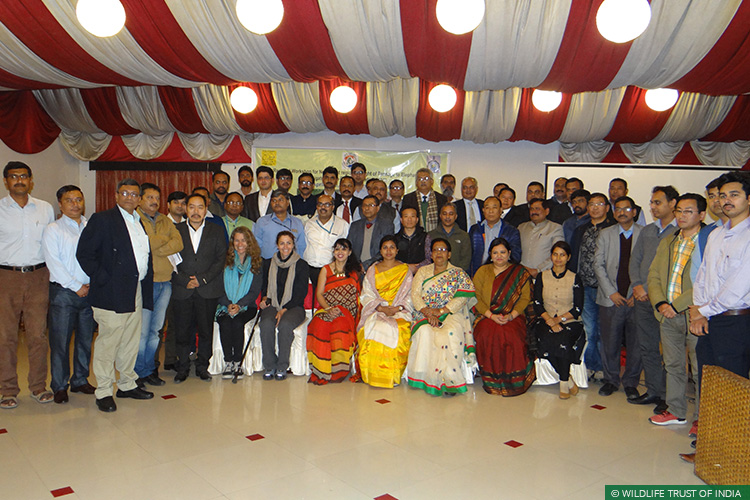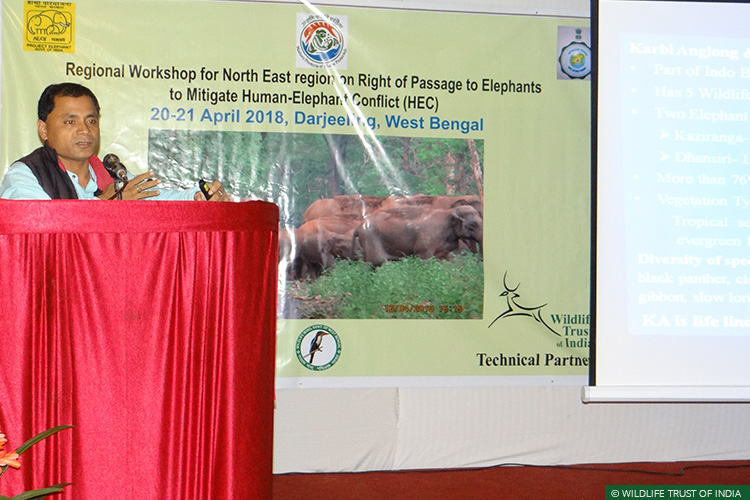
Darjeeling, West Bengal, April 22, 2018: With a focus on the planning and implementation of elephant conservation programmes based on a landscape management approach, the Ministry of Environment, Forest & Climate Change (MoEF & CC) had decided to organise four regional technical workshops involving major stakeholders to formulate strategies for the protection of elephant habitats. The first such workshop, focused on the South Indian states, was held in Thiruvananthapuram in January this year. The second regional technical workshop, for North-East India, was held in Darjeeling, West Bengal on April 20 and 21.
The workshop was organised under the aegis of the MoEF & CC and the West Bengal Forest Department, with Wildlife Trust of India (WTI) and the Wildlife Institute of India (WII) as technical partners. The central theme was ‘Right of Passage to Elephants to Mitigate Human Elephant Conflict’, with a focus North-East India (including northern West Bengal). Senior administrative officials representing the region’s state governments, managers of Elephant Reserves and Protected Areas, and other stakeholders were present.
ADG (Wildlife) MS Negi stressed that stakeholders like the Railways, National Highway Authority of India, state electricity boards and tea estates must assume their share of responsibility for elephant conservation.
The workshop was inaugurated with the traditional lighting of the lamp. RK Sinha (IFS), Principal Chief Conservator of Forests (Wildlife) & Chief Wildlife Warden, Government of West Bengal, delivered the welcome address. In his speech to the delegates, MS Negi, the Additional Director General (Wildlife), MoEF & CC, stressed that stakeholders like the Railways, National Highway Authority of India, state electricity boards and tea estates must assume their share of responsibility for elephant conservation and contribute financially to conserve Asian elephants. Noyal Thomas (IFS), Inspector General of Forests (Project Elephant) outlined the aims of the workshop and presented an overview of the first technical workshop held in Thiruvananthapuram. Chandan Sinha (IAS), the Principal Secretary, Department of Forests, Government of West Bengal, also addressed the delegates. S Barari (IFS), PCCF (General), Government of West Bengal, attended proceedings on the second day.
The first technical session examined ‘Corridors, connectivity and landscape management for elephant conservation.’ Other technical sessions at the workshop focused on ‘Protection and Habitat Management in Elephant Reserves’. WTI’s General Manager (Policy) Dr Prajna Panda made a presentation on securing elephant corridors in North-East India. Dilip Deori, who heads WTI’s Kaziranga – Karbi Anglong Link Project, highlighted the Kalapahar-Daigrung elephant corridor, which WTI has partially secured through the voluntary relocation of Ram Terang village, as a successful securement model.
 WTI’s Dilip Deori presenting the Kalapahar-Daigrung elephant corridor as a securement case study
WTI’s Dilip Deori presenting the Kalapahar-Daigrung elephant corridor as a securement case study
Mukti Roy, a Research Scientist at the Indian Institute of Science, spoke about crop raiding and elephant corridors in northern West Bengal, while WII Project Associate N Lakshminarayan presented a case study on the conservation and management of elephants in Chhattisgarh. Discussions were also held on the need to sensitise local communities about the importance of elephant corridors and how blocking such passages has aggravated conflict. The role of civil society in assisting state forest departments in securing corridors was also discussed.
Of the 101 elephant corridors mapped across India and detailed in the Right of Passage publication produced in 2017 by WTI, Project Elephant and the UK-based NGO Elephant Family, 23 corridors are located in the North-East and 14 in northern West Bengal. WTI has helped secure two vital corridors in Meghalaya and is currently in the process of securing six corridors in Assam.